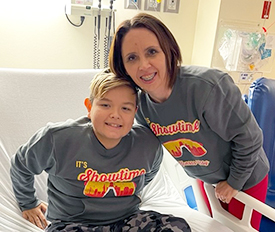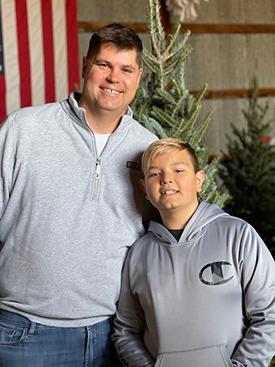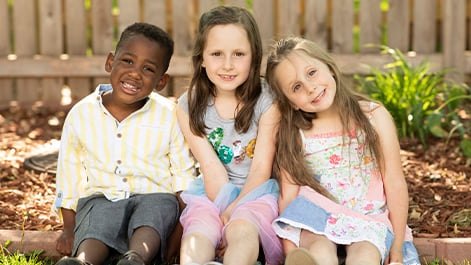A Better Quality of Life: Hayden's Story
Meet Hayden
After driving nearly three hours to the hospital with an imminent snowstorm, 13-year-old Hayden Murnahan, his parents and his doctors all waited anxiously to find out if his life-changing kidney would arrive from West Virginia. It was an extremely good match, but there was a short window of time and odds were not in their favor.
But they held onto hope.
After more than a decade in and out of the hospital, undergoing dialysis, and experiencing multiple viral infections, while remaining under the care of Vimal Chadha, MD, Associate Director of Dialysis and Transplantation at Children’s Mercy Kansas City, this second transplant could allow Hayden a better quality of life—the chance to be a kid unburdened by daily dialysis.
Would this kidney from a near-perfect donor be in good enough shape? Would the private plane chartered from a generous private donor make it as a winter storm loomed over Kansas City? Could the transplant surgery be completed in time? At 10 p.m. that night, these questions were still unanswered in the climax to Hayden's 13-year health journey so far.
Hayden’s kidney issues began in infancy
Hayden’s history with kidney disease started before his first birthday. Learning that he had severe kidney disease from standard bloodwork at his nine-month checkup was a shock for his mom Crystal.
“Up to that point, we didn’t know anything was wrong.” she said. “There weren’t really any signs, and next thing we knew, our doctor was referring us to Children’s Mercy.”
It turned out Hayden’s kidneys were dysplastic, and he was going to need a transplant. Crystal says from nine months old until Hayden was 3, it was a month-by-month process watching his labs and getting him big enough and healthy enough to receive a kidney transplant. When he reached that goal size and weight, a friend of the family offered to donate her kidney.
“You don’t want your child to have to get a transplant, but as a mom, you want what’s best for your son,” Crystal said. “While we knew this wasn’t a cure, it was going to give him the best shot at being happy and healthy and able to keep up with other little kids.”
Dr. Chadha said the surgery went well, and initially, Hayden did great. About a year later, however, Hayden started gaining more weight than would be expected and blood work and a kidney biopsy revealed that he had developed antibodies and he started to reject the new kidney.
In the nearly six years that followed, the nephrology team and Hayden’s family continuously worked together to treat the rejection, monitor and stabilize the high blood pressure Hayden had developed and fight off viral infections from immunosuppressive medications. His course included multiple hospitalizations, which put a strain on the family who lived nearly three hours away in Salina, Kan.
“Normally, after a transplant, we would expect the number of required medications to decrease over time, accompanied by an improved quality of life; unfortunately, in this case the opposite was true,” Dr. Chadha said. “I had a discussion with Crystal, and although his transplanted kidney was still functioning, I told her that ‘this kidney is causing more harm than good. He has had enough.’ And we decided to remove that kidney in July 2019.”
Training to do dialysis at home
With no functioning kidneys, Hayden was placed on home peritoneal dialysis. Unfortunately, it wasn’t long before the peritoneal dialysis catheter started migrating inside his belly and had to be surgically repositioned twice. He then developed an umbilical hernia that also required surgical correction. These multiple surgeries led to leakage of dialysis fluid into his abdominal wall making continuation of peritoneal dialysis almost impossible. Hemodialysis was the only option at this point, but the family’s distance from the hospital complicated matters.
“My husband and I were trying to work full-time jobs while going to Kansas City three times a week for dialysis at the hospital,” Crystal said. “We couldn’t have kept doing that and kept our jobs.”
She says she felt honored then when the Children’s Mercy team decided to set up a six-week training to allow her and her husband, Steve, to do hemodialysis at home.
“I’ve told Dr. Chadha and the nephrology team what a blessing that was for us,” Crystal said. “They were willing to put their trust in us to take care of Hayden two and a half hours away. With their thorough training and support, I felt absolutely comfortable; it was a great fit for our family.”
For two years, Crystal spent four hours a night setting up and doing dialysis with Hayden, and prepping and cleaning equipment for the next day. She said he was doing well, but they knew this was not a permanent solution.
After fighting off persistent viral infections and eventually discontinuing immunosuppressive medications all together, Hayden’s antibody levels continued to rise and eventually reached a panel reactive antibody (PRA) level of 100 percent, meaning there was a less than 1 percent chance of finding a matching donor for Hayden. Finding another kidney would be tough, but this was the next step for Hayden.
Going above and beyond for a second transplant

With 100% PRA, Hayden was high on the transplant waiting list and eligible to receive a matching kidney from across the nation. Whereas there were occasional donor offers, they were usually coming from far away states and the donor kidney quality was less than optimal.
Finally, on Jan. 5, 2022, Dr. Chadha got word of a match for Hayden.
“It was the perfect kidney, a perfect match—I could not have asked for a better kidney for him,” Dr. Chadha said. “The problem was that it was in West Virginia, and a snowstorm was coming.” The logistical challenge of getting the kidney to Kansas City once it was removed from the donor, and then transplanted into Hayden ideally in less than 16-18 hours seemed like a daunting task.
Based on the timing of the kidney removal and the incoming storm, it was highly unlikely that there would be any commercial flights that would be able to bring the kidney to Kansas City that night. Even though the chances of getting the kidney in time seemed slim, Dr. Chadha talked to the family, and they agreed to come to the hospital to prepare for surgery just in case. Crystal took off from work to travel to Kansas City, even though it seemed nearly impossible that they would get this kidney.
That’s when a private donor stepped in to make the transplant a reality. The donor, who knew Hayden’s situation and his health issues, offered to provide a private plane to make sure that Hayden and his family did not miss this opportunity. Despite all the obstacles, they were resolute about getting this kidney for Hayden.
“That’s where things got real,” Crystal said. “It’s pretty humbling, and never did I dream we would be in a situation where someone would offer a private plane to go get my son a kidney.”
There were still logistics to figure out in a short period of time and plenty that could go wrong. Crystal says it was all surreal and an emotional rollercoaster. Then, at 10 p.m., the nurse walked in and told her Dr. Chadha was on the phone. He said everything worked out, and the surgery was a go after it arrived in the early hours of Jan. 6, 2022.
A new kidney brings renewed hope

Hayden’s second transplant took place the next morning, and all has gone well since that time. Crystal says Hayden is feeling much better than before and is looking forward to being able to do things with family and friends, to get back to school and summer activities, and to not have to be hooked up to a machine every night—to finally get to be a kid.
“I can’t say enough about Dr. Chadha and all of the nurses, child life teams—Amanda Porter with nephrology child life was a huge part in this journey—the dialysis teams and transplant teams,” Crystal said. “We think of them as family. It’s amazing the trust they placed in me to do home dialysis and the way they listen and communicate to really give kids the best quality of life. It just makes things easier when you have a team that is on the same page and wants the same thing for your child. It puts Children’s Mercy above the rest.”
“This took so many pieces to fall into place,” Dr. Chadha said. “From the first transplant to the hospitalizations and home dialysis, to suddenly getting a kidney that is a perfect match for him but coming from a faraway place on a stormy night, everything had to come together for this to all work out—and it did. If we did not have that plane, though, there was no way that this wonderful outcome would have taken place."
Chronic kidney disease: Levi's story
Love drew Dan and Julie Ryff to Levi, an infant in need of serious medical care. With the help of Children’s Mercy specialists, Levi grew from a tiny baby with an unknown future facing chronic kidney disease to a healthy, racing toddler who loves superheroes.

Kidney and liver transplant: Brylynn's story
Brylynn needed a new kidney and liver. Surgeons transplanted both, giving her more moments with mom.
Director, Acute Kidney Injury, Nephrology; Associate Director, Dialysis & Transplantation, Dialysis and Transplantation Section of Pediatric Nephrology; Professor of Pediatrics, University of Missouri-Kansas City School of Medicine; Clinical Associate Professor of Pediatrics, University of Kansas School of Medicine